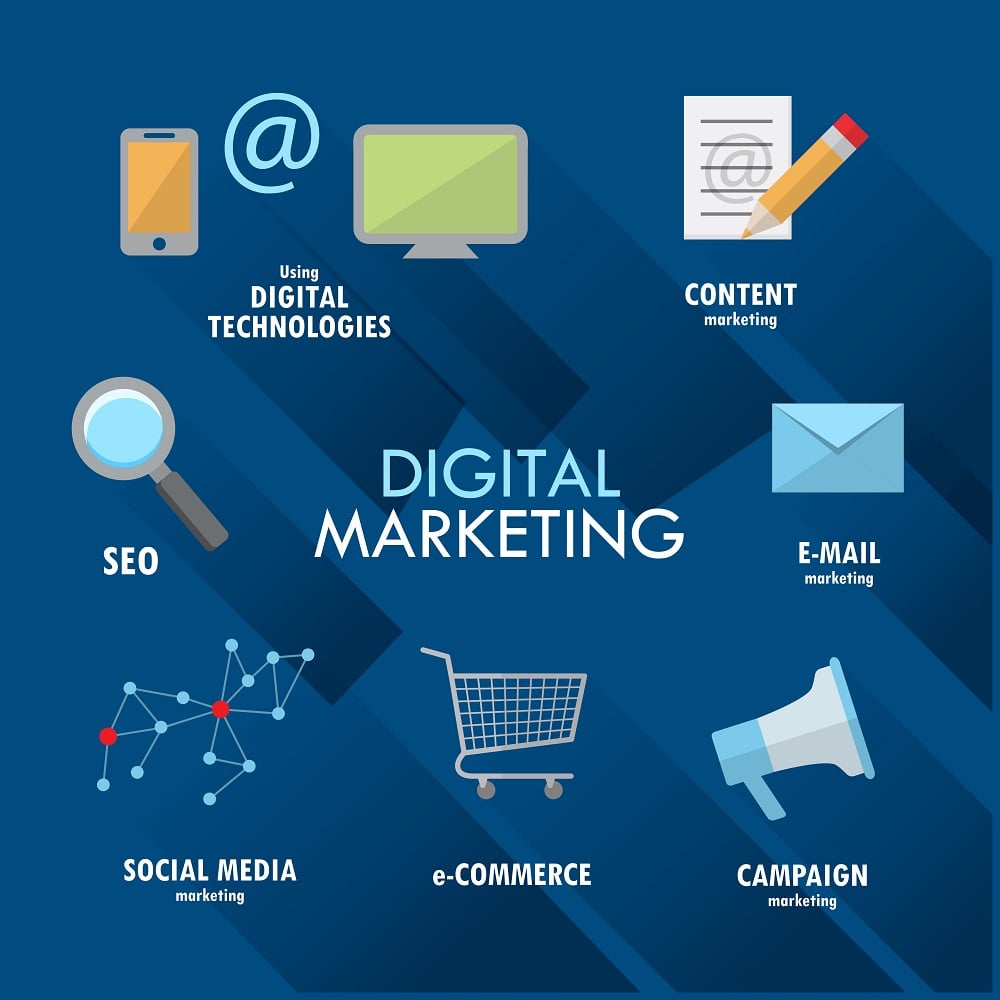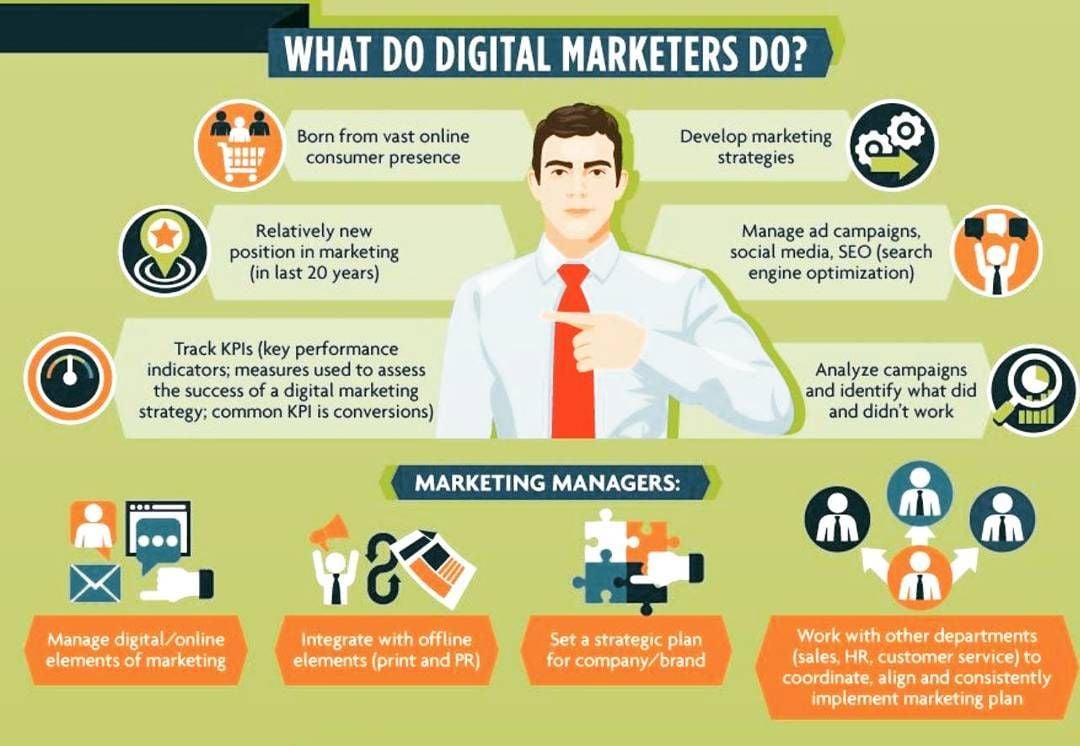If you’re considering a career pivot into digital marketing, you probably have a variety of questions on your mind. How long does it take to become a digital marketer? How much do digital marketers earn? And what exactly do digital marketers do all day?
To help you envision yourself in a digital marketing role, let’s explore the day-to-day responsibilities of a digital marketing professional.
Is Digital Marketing a Demanding Job?
Digital marketing is a vast landscape. Particularly in larger companies, digital marketers often specialize in specific techniques like SEO (search engine optimization), PPC (pay-per-click advertising), SEM (search engine marketing) email marketing, content marketing, social media marketing, and more.

The constant evolution of the digital marketing industry means that you’ll need to stay current with emergent marketing trends, shifting platform protocols, changing customer behaviors, and new management strategies. Digital marketers keep a finger on the pulse by reviewing industry newsletters, analyzing successful digital marketing campaigns, and engaging digital marketing experts online.
Unlike traditional marketing, digital marketing utilizes personalization to produce customer satisfaction. Digital tools also help marketers evaluate the effectiveness of a marketing plan with real-time data. Depending on key performance metrics, digital marketers may need to adapt campaigns as they unfold.
With the right technical skills and hands-on experience, you’ll rise to digital marketing challenges with ease.
A Day in the Life of a Digital Marketer: What to Expect

Digital marketing jobs vary according to specialization, so let’s take a look at a day in the life of a content marketer—a critical contributor to any digital marketing team. Content marketers plan, develop, and publish digital content to boost brand awareness, bolster sales, foster audience engagement, and build brand loyalty.
Morning
Content marketers may produce content across digital channels including social media platforms, blogs, podcasts, and more. As a content marketer, your day will begin with assessing the performance of your content and planning the next steps in response.
Here’s what a typical morning workflow might look like:
Task Review

Your daily tasks might range from audience research to reviewing campaign performance data from Google Analytics. Morning is the best time to round up responsibilities in a to-do list.
Checking Email Briefly
Scan your inbox for urgent matters and move on. Save in-depth email communication for later in the day.
Viewing Reports
Content marketing reports summarize the performance of your content according to key performance indicators that monitor engagement, conversions, lead generation, and more. This data will inform your strategy moving forward.
Prioritizing Tasks for the Day
Evaluate your to-do list and identify critical matters that will require your immediate attention.
Afternoon
As a content marketer, you’ll be responsible for developing a content strategy that outlines how you will use content to achieve business goals. A strong content strategy will engage your audience at every stage of the sales funnel and transform customers into brand evangelists.
Here’s how a typical afternoon workflow might support content strategy development:
Digital Marketing Campaign Management and Planning
After defining your goals and conducting buyer persona research, you’ll need to decide what kind of content to create, where to publish it, and how to measure its success.
Meetings
You’ll meet with sales teams about business goals and with other team members to coordinate your broader digital marketing strategy.

Checking Email for Real
This is your opportunity to respond to internal requests and comb through your inbox for project updates.
Slack Reminders.

To boost productivity, set automated reminders for yourself to ensure you attend to tomorrow’s tasks.
When You Have Time
Content marketing also integrates aspects of PR, copywriting, and interdisciplinary collaboration.
As a content marketer, you’ll also need to make time for activities like:
Outreach
Promote your content to key contacts or outlets that would find your content valuable. This might include relevant blogs, news sites, or influencers.
Writing and Editing
Set aside time for content creation. Even if your team has a dedicated content writer, you’ll still need to craft and tweak ad copy, social media posts, blog posts, and other types of original content.
Checking In With Other Teams
Touch base with the UX design team to learn more about their user research or check-in with sales to discuss conversion data and pinpoint areas for improvement.

Tips for Staying Productive (and Avoiding Burnout)
Wondering how to generate high-quality work consistently? Here’s how to stay productive without burning out.
Stick to a Routine
Routines reduce stress levels and lead to better sleep, which in turn improves mental acuity and energy levels. To stay productive, commit to a personal routine as well as a work routine—try to go to bed and wake up at roughly the same time every day. Carve out time to eat and disengage from work at regular intervals.
To create an effective work routine, design a workflow around your typical fluctuation of energy and mood throughout the day. Set long and short-term goals, and break each goal down into actionable steps that can be integrated into your routine. Replace an open-ended to-do list with time blocking, which is a time management tactic that divides your day into blocks of time. During each block, you’ll work towards achieving a specific task or group of tasks.
Do High Priority Work in the Morning
According to Josh Davis, author of Two Awesome Hours: Science-Based Strategies to Harness Your Best Time and Get Your Most Important Work Done, the morning offers unique productivity-related advantages. We typically have more mental energy in the morning, broadening our capacity to engage the prefrontal cortex and think creatively.
Because urgent tasks that require immediate reactions tend to accumulate later in the day, mornings create more room to focus. Fewer small decisions will demand your attention and drain your ability to regulate and stay on task. Reserve this time for your most important work.
Fall in Love With Planning
Planning will help reduce stress, improve focus, and organize your time. Try out these tips for daily, weekly, and quarterly planning:
Daily Planning
Strive for consistency and visibility. Keep your schedule of daily tasks in sight, and update it at the same time every morning.
Weekly
Review your long-term goals before setting weekly priorities. Make a detailed list, prioritize three to seven items, and outline action steps.
Quarterly
Quarterly planning is the implementation of an annual plan divided into four three-month quarters. While creating quarterly plans, reflect on last quarter’s successes and challenges and adjust your next 90-day plan accordingly.
Take Breaks
According to Cal Newport, author of Deep Work: Rules for Focused Success in a Distracted World, breaks are essential to maintaining productivity.

“If you’re working day after day and not letting up, you will burn out,” he warns. Skipping breaks can negatively impact focus and concentration, so be sure to schedule breaks on a daily basis. During breaks, avoid work-adjacent activities or tasks you can’t finish to prevent mental drag when it’s time to get back to work. Avoid social media channels and try meditating, stretching, walking outside, or socializing.
Breaks are just as important when working from home. When your workspace is tangled up with your personal space, it’s hard to know when and where the work day begins and ends. Use breaks to reinforce boundaries between work and home life.
Since you’re here…
Want to bring your marketing skills into the 21st century? Check out our free digital marketing curriculum for new ideas and insights.


![What Does a Digital Marketer Really Do [Skills Guide 2022]](https://www.springboard.com/blog/wp-content/uploads/2022/04/what-does-a-digital-marketer-really-do-skills-guide-2022.png)

